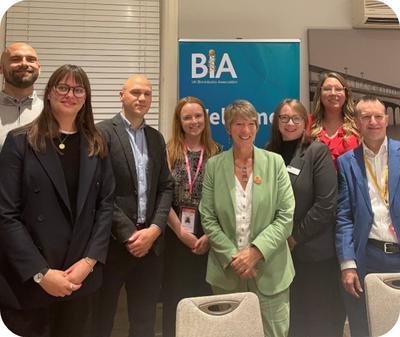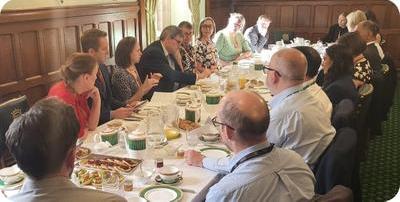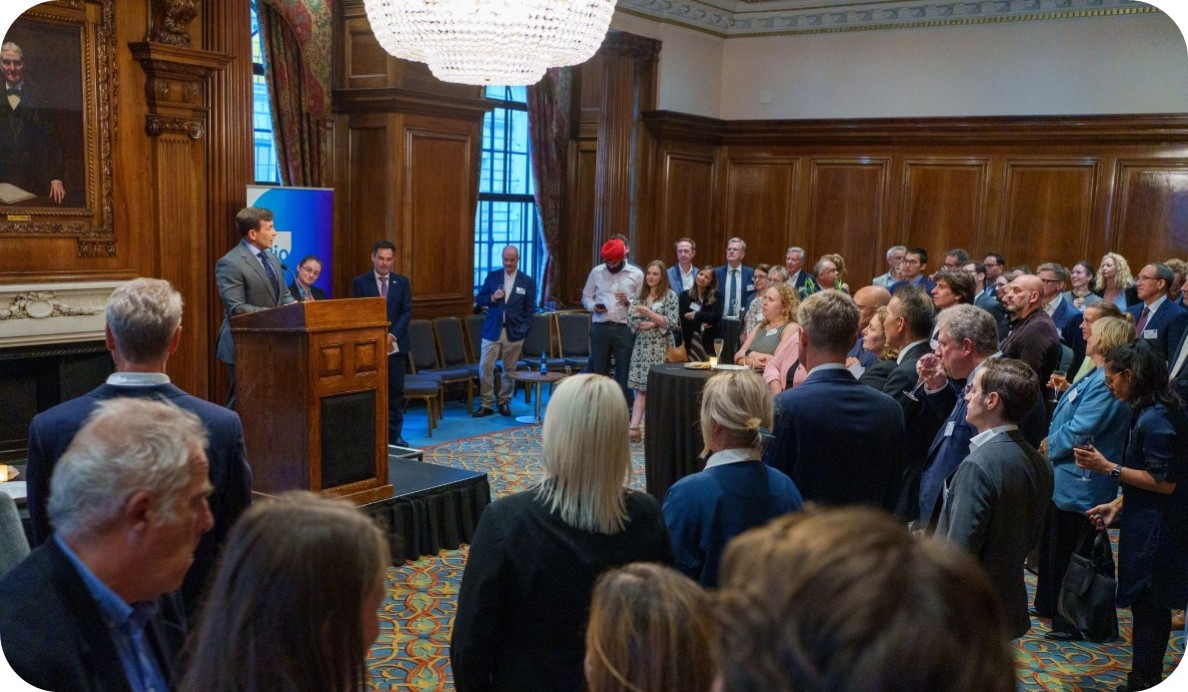
Introduction
Our third quarter of has been focused on cementing and building upon our influence achieved in the key government policy documents that were published just before summer, such as the industrial Strategy and Life Sciences Sector Plan. Having secured government commitments across the breadth of our policy interests in the Sector Plan – on access to finance, data, regulation and much more – we have been meeting with officials and agencies to discuss the strategies’ practical delivery and to ensure SMEs are at the heart of their thinking.
Engagement with parliamentarians and the political parties at their annual conferences in September also sought to embed an understanding among policy makers of our sector’s priorities. In an increasingly fragmented political landscape, we have stepped up our engagement with the smaller parties, including holding our first roundtable at a Liberal Democrats conference and attending the Reform UK conference for the first time.
As we head into the autumn, our country’s public finances and wrangling over the price of medicines are causing concern at home, and the Trump Administration’s threats of tariffs and Most Favoured Nation drugs pricing are sending ripples across our global sector. Against this dynamic backdrop, the BIA’s policy and public affairs team continues to work hard on behalf of all our members to ensure the UK remains a strong and stable environment for life science companies to start, scale and invest.

Read on for a full breakdown of what we have been doing on your behalf.
Government and Parliament
BIA at party conferences: championing UK life sciences across the political spectrum
This conference season, BIA ensured biotech remained central to political conversations on growth, investment and innovation across the major parties.

BIA expanded our conference presence this year, hosting our first private roundtable at the Liberal Democrat Conference. This focused on collaboration across the life sciences ecosystem and how the Lib Dems can help ensure accountability for delivery on the Government’s Life Sciences Sector Plan – specifically on smarter clinical trials, streamlined regulation and better access to treatments for NHS patients. Pippa Heylings MP and Rubina Ahmed (Blood Cancer UK) opened the session, also joined by BIA corporate members and third sector ecosystem partners.
At the Labour and Conservative Party Conferences, BIA hosted panel events exploring solutions for fixing the UK’s scale-up deficit thereby preventing innovative business moving overseas. We welcomed labour MPs Callum Anderson and Daniel Zeichner onto our panel in Liverpool, and George Freeman MP in Manchester. Lucy Foley (eXmoor pharma), Lisa Anson (Redx pharma), Veronica Humble (Natwest Cushon) and Toby Reid (Pioneer Group) and Martin Turner (BIA) supplied compelling insights from the sector.

Discussions on pensions reform dominated the Labour Conference fringe, with strong momentum behind unlocking capital - a long-standing BIA goal now firmly mainstream.
We also attended business days at both Liberal Democrat and Labour Conferences. At the Liberal Democrats, we took part in a roundtable on supporting innovative sectors with the Liberal Democrat spokespeople for Science, Innovation and Technology in both the Commons and the Lords, Victoria Collins MP and Lord Clement-Jones. We also spoke to Liberal Democrat leader Ed Davey MP about the demand for international talent in UK life sciences.
At Labour’s Small Business Day, BIA met Blair McDougall MP, the new Minister for Small Business and Industrial Strategy, to underline the need for improved access to finance for scaling life science firms, a priority he shares and will pursue through regular SME engagement. We also spoke with Dame Meg Hillier MP on concerns around R&D tax relief delivery ahead of the Treasury Committee, which Dame Meg Chairs, meeting the HMRC CEO.
BIA’s first visit to Reform UK’s conference revealed limited policy development beyond immigration. However, comments on growth capital and UK science suggest emerging interest in innovation.
BIA is actively following up on these connections, and many more made across the conference season, to ensure a strong, cross-party advocacy base that keeps UK life sciences at the forefront of political and economic decision-making. You can find out more in our blogs on Labour Party Conference and the Opposition.

Cross-sector APPG roundtable discusses embedding research and innovation in the NHS
On the day the Life Sciences Sector Plan was published, and just days after the launch of the NHS 10 Year Health Plan, we held the second in a new series of parliamentary roundtables under the banner of the All-Party Parliamentary Group (APPG) for Life Sciences. The timing offered a perfect opportunity to raise the pinch points and enablers for the plans’ successful delivery.
In a timely and wide-ranging discussion, participants agreed that research must be seen as a core NHS function, not a ‘nice to have’. They highlighted the need to address the decline in clinical academics and support a research-active and research-aware workforce. Ensuring diverse patient participation in studies and tackling system fragmentation were seen as essential to accelerating innovation. The discussion also underlined the importance of improving access to private finance and venture capital, harnessing the UK’s strengths, and identifying how parliamentarians can help turn ambition into action.

Speakers and contributors included Kit Malthouse MP, Emily Darlington MP, Steve Yemm MP, Kevin Bonavia MP, Chief Scientific Adviser Lucy Chappell, Dr Sonya Babu-Narayan, Dr Kam Pooni, and representatives from the group’s secretariat (BIA, ABPI, AMRC, BIVDA, BHF, CRUK, Versus Arthritis, and the Academy of Medical Sciences).

The meeting reflected the BIA’s ongoing influence in ensuring the voice of the UK life sciences sector is at the heart of policymaking, and with collaborative cross-sector and cross-party backing. The APPG continues to draw interest from a wide range of MPs and peers, who we continue to support with the latest briefings and news from the sector.
Delivery of Sector Plan begins, shaped by BIA

Following the publication of the Life Sciences Sector Plan in July, officials from the Office for Life Sciences (OLS) and HM Treasury attended the Q3 BIA Advisory Committee meetings to explain the Government’s commitments and get input from members on which areas should be prioritised for delivery. The BIA team also fed in directly to the Science Minister, Lord Vallance, on behalf of all members.
The investment environment, clinical trials and link up between MHRA and Nice, alongside the commercial environment, were all highlighted as areas in need of urgent attention. BIA also raised concerns about SME involvement in and access to health data cohorts.
Martin Turner, BIA’s Director of Policy and External Affairs, also spoke at the OLS’ awayday in August, where he was invited to provide our views on the Sector Plan and brief the department’s 120 staff on the current operating environment for UK life sciences companies.
BIO delegation to UK facilitated by BIA

BIA was delighted to welcome our US sister trade association, BIO, in early September, as its CEO, John Crowly, led a delegation of BIO policy experts and US companies to meet with UK policy makers, regulators and BIA members.
At a time of heightened geopolitical tension, the visit was an opportunity to strengthen the bonds between the world’s two leading life science ecosystems, and discuss what’s needed for both to succeed. BIO met with UK stakeholders including the Prime Minister’s Business Adviser, Varun Chandra, Science Minister Lord Vallance, and the leadership of MHRA and Nice.
BIA and BIO also held a joint networking reception in Westminster, attended by industry leaders and policy makers.

Surprise ministerial reshuffle brings new faces for BIA to engage with
The Prime Minister made a surprise and large reshuffle in September following the resignation of Deputy Prime Minister Angela Raynor. This means some ministers BIA has built relationships with moved to new roles and there are some new faces for us to engage with.
Science Secretary, Peter Kyle MP, moved to become Business Secretary and was replaced by Liz Kendall MP. The Department for Health once again has a single minister responsible for all life sciences interests, from genomics to regulation. Transplant and vascular surgeon Dr Zubir Ahmed MP has taken up this critical role, which was previously split across several ministers. A new investment minister was also appointed in the business department; entrepreneur and business leader Jason Stockwood will be elevated to the House of Lords to take on the role. Lord Vallance remains Science Minister.
BIA has written to all the new ministers setting out our policy priorities and seeking a meeting.
Also starting a new job this quarter was former BIA CEO Steve Bates, who took up the post of Executive Chair of the Office for Life Sciences on 29 September. The role, which is the first of its kind, means BIA has even stronger links into government.
Business environment
Finance and Tax
BBB’s investment plan for the life sciences showcased at joint roundtable with the BIA
The BIA hosted a roundtable with the British Business Bank (BBB) that brought together investors and life science companies from across the UK to discuss the BBB’s approach to investment in the life sciences.
Following the launch of the Industrial Strategy, £4 billlion will be invested by the BBB into the eight growth-driving sectors identified in the Strategy – of which the life sciences is one. An additional c£12 billion of private capital will be crowded in, leading to around £16bn to be invested into innovation across the next four years.
This capital needs to be deployed strategically into the life sciences to unlock economic growth and boost the sector, and so this roundtable was an important opportunity for the bank to meet with on-the-ground experts from across BIA’s membership to help inform their investment strategy for the life sciences.
BIA raises life science financial priorities in talks across HM Treasury
The BIA have engaged in a number of meetings across HM Treasury over the past quarter – as well as welcoming the Head of Policy Strategy for pensions investment to our Finance and Tax Advisory Committee – to discuss access to finance, R&D tax relief, and the pensions agenda.
BIA and members reiterated the importance of unlocking scale-up capital for UK life science companies, and how pension funds have a crucial role to play in this. Due to a lack of movement from pension funds, the BIA called for action and intervention from government to hold the funds to account, and get capital flowing.
The importance of R&D tax relief was also reiterated, with the BIA’s new methodology for accurately assessing the value of these reliefs sent to the Chancellor’s new advisor, Professor John van Reenan, for consideration. Professor van Reenan is an economist specialising in innovation incentives and has written extensively on the effectiveness of R&D tax relief.
International trade agreements evaluated by the BIA
The BIA has submitted evidence to the Business and Trade Committee’s inquiry on UK trade agreements with the US, India, and the EU, which seeks to assess the impact of trade agreements on people, businesses, and the wider economy.
In our submission, the BIA highlighted the need to:
- Eliminate tariffs that risk holding back the growth of UK life sciences, particularly manufacturing businesses.
- Encourage international regulatory cooperation to address barriers to trade while maintaining the UK’s pro-innovation approach.
- Maintain strong and enforceable intellectual property protections, which are fundamental to underpinning innovation and investment, safeguarding research, enabling collaboration, and supporting companies to compete globally.
Effective and balanced trade agreements between countries are essential for the resilience and growth of the UK sector, and must facilitate a fertile environment for the life sciences. Therefore, our submission was an important step in ensuring that the agreements are working for the life sciences.
BIA backs public funding for innovation in Shadow Policy Review
The BIA responded to a policy review from the Shadow Secretary for Science, Innovation and Technology, Alan Mak MP, that sought to understand the role that public funding plays in the innovation ecosystem. Our response emphasised that public funding is essential for the delivery of both economic growth and publicly beneficial innovations that the life science sector can provide.
The response underlined that despite its world-leading status, the UK life sciences sector suffers from a lack of domestic scale-up capital. Public funding plays a key role in overcoming this challenge, attracting private investment, and crowding in capital, both of which are crucial for the continued health and growth of the sector.
Engaging and responding to policy reviews like this one are an effective way to pre-emptively safeguard the funding streams that underpin the UK’s global leadership in life sciences, and ensure the sector continues to deliver both economic and societal benefit.
IP and tech transfer
BIA meets with Secretaries of State on copyright & AI
In July, BIA, represented by our IP Advisory Committee (IPAC) leads on Data & AI, attended a meeting with the Secretaries of State for Science, Technology and Innovation (then Peter Kyle MP) and for Culture, Media and Sport (Lisa Nandy MP) on the ongoing public and parliamentary copyright and AI debate.

The meeting was attended by representatives from the creative and tech industries as well as industry bodies. The views expressed around the table ranged from bodies representing musicians to leading tech companies. BIA represented the life sciences industry views, focusing on the need for continued access to quality data, and preference for a transparent opt-out system.
The roundtable followed on from the ongoing Copyright & AI Government consultation that BIA responded to, with legislative measures envisioned by Government next year. BIA continue to engage by representing the life sciences sector on the Government’s expert working groups on this topic.
Regulation and Access
MHRA-BIA bilateral provides forum for strategic discussion on regulatory priorities
In September, the BIA held its biannual bilateral meeting with the senior leadership of the MHRA. This was the first bilateral meeting with the MHRA’s new Chief Executive Lawrence Tallon, who provided an update on his strategic priorities and his ambitions for the MHRA to be a global leader in key areas of UK strength. He also outlined the MHRA’s improved performance, with the agency now meeting statutory timelines for all clinical trial and medicines licensing applications.
The discussion at the meeting covered topics including MHRA’s plans for scientific advice, including the new integrated scientific advice service with NICE. There was also discussion on plans for the BIA’s Future of UK Life Sciences Regulation conference on 6 November, which will feature keynote speeches from MHRA leadership, and presentations and discussions covering topics including clinical trials, patient access, and smart regulation.
BIA answers POST’s call-for-evidence with a submission stressing the necessity of animal research for the UK life sciences sector
BIA submitted a response to the Parliamentary Office of Science and Technology’s (POST) on technological alternatives to using animals in life sciences research. POST is Parliament’s in-house, impartial research service, which provides policymakers with briefs on complex or emerging topics.
BIA’s submission stressed that while there was progress with technological alternatives or New Approach Methodologies (NAMs), the use of animals remains a necessity in life sciences research and government policy should therefore phase in NAMs and not set arbitrary deadlines.
For the UK’s hundreds of life sciences SMEs to stay here and keep scaling, the UK must remain a predictable and supportive environment, through clear, reasonable regulatory expectations and practical routes to adoption, and it is vital that policymakers understand this.
POST’s call for evidence follows the Life Sciences Sector Plan discussing ongoing efforts to replace, reduce, and refine the use of animals in research, and the government’s commitment to phase out animal testing in partnership with scientists, industry, and civil society, with a strategy for supporting alternative methods to be published this year.
Engagement with partners continues on Action 25 of the England Rare Disease Action Plan
BIA has continued to advocate for improved UK patient access to treatments for rare diseases. In July, we attended a DHSC-led workshop with NICE, MHRA and NHS England, to present the findings of our latest rare disease member survey, carried out jointly with the ABPI. The survey captured companies’ perspectives and experiences of specific access pathways and the wider commercial environment for rare disease medicines in the UK.
This builds on our 2023 member survey in support of Action 25 of the 2023 England Rare Disease Action Plan ‘To review the effectiveness of EAMS, ILAP and the IMF in improving access to treatments for people living with rare diseases.’. Following new policy developments and a commitment in the 2025 Action Plan for delivery partners to meet annually, we reassessed companies’ experiences of the UK access and reimbursement system for rare disease medicines. We also compared availability in other markets, and factors influencing future launch decisions.
At the workshop in July, we engaged directly with government, patient advocates and clinicians on the challenges in supporting access to rare disease therapies in robust discussions.
The BIA is working with DHSC and delivery partners on a set of actions to address challenges identified in the survey and maintain momentum from the workshop. We also continue to support calls to extend the work of the UK Rare Disease Framework beyond its current remit in January 2026, especially on addressing gaps in treatment through clearly defined actions and metrics that deliver meaningful change.
BIA continues to call for a shift in NHS medicine spending amid evolving commercial environment discussions
Following the announcement that the government and pharmaceutical industry were unable to reach an agreement on changes to VPAG, recent headlines demonstrating company decisions to pause or withdraw investment in the UK have underlined key challenges in the UK commercial environment for the life sciences sector.
The BIA has made the case that increasing NHS medicine spending would enhance patient access to new treatments as well as strengthen the UK’s attractiveness as a destination to develop innovative products, and we continue to call for a pro-innovation environment that supports both SMEs and large pharmaceutical companies within the life science ecosystem. We welcome comments made by Zubir Ahmed MP on the need to consider wider economic and clinical benefits within medicines value assessments during the Science, Innovation and Technology Committee session on life sciences investment.
Following the recent ministerial reshuffle, the BIA write to new ministers highlighting the importance of addressing these challenges and is seeking meetings to ensure the UK remains a thriving life sciences hub and a competitive destination for companies to research, manufacture and launch innovative medicines. We encourage the Government to ensure investment in medical innovation remains a priority to help drive more funding raises and UK success stories.
Skills and Talent
BIA pushes Government to unlock the potential of the Global Talent visa
The Global Talent visa (GTv) was launched in 2020 to attract exceptional individuals and promising talent with expertise in science, research, engineering, and technology. While the scheme offers flexibility and a fast track to settlement, evidence gathered from BIA members showed it was failing to meet its full potential for innovative businesses and entrepreneurs in the UK life sciences and biotech sector.
In September, we wrote to the Chancellor, and minister for migration and citizenship Mike Tapp, urging them to make changes to the scheme.
Over the summer BIA have been working with Government, on key recommendations. These include:
- Online guidance being revised with business-focused case studies
- Awareness campaigns targeted at innovative start-ups and SMEs
- Endorsing criteria expanded to include life sciences and biotech businesses.
These changes will ensure the UK can attract and retain the global innovators needed to scale companies, accelerate breakthroughs, and strengthen the UK’s position as a world-leading life sciences hub for international talent. We will continue to campaign on the issue as the Autumn budget approaches.
Manufacturing
Medicine supply resilience depends on domestic manufacturing, BIA tells Lords
BIA responded to the House of Lords inquiry into the UK’s ability to predict and prevent medicine supply issues to highlight both the UK’s strengths, which largely stem from its innovative SME base, and its vulnerabilities. Supply chain resilience can be improved by increasing the number of UK-based developers, producers, and manufacturers, particularly SMEs, which account for around 70% of medicines in development worldwide and play a vital role in innovative manufacturing. Structural barriers, such as capital funding shortfalls compared to the US, high operating costs, limited tax and investment incentives, long trial set-up times, and dual batch release testing all reduce competitiveness as a manufacturing base. To secure resilience, policies must support SMEs as well as larger companies, encourage continued investment in innovative medicines, and create the conditions for the UK to scale up manufacturing and retain high-value activity.
BIA arms journalists with the latest facts as mRNA technologies are in the spotlight for ‘RNA week’
BIA launched the updated mRNA Revolution explainer, with expanded coverage on the evolving regulatory landscape, the critical role of apprenticeships and skills development, and the changing dynamics of investment. The report reflected the UK's proactive approach to cementing its position as a global leader in mRNA innovation.

The explainer was used to brief journalists ahead of RNA Week, in which RNA was deservingly catapulted further into the spotlight. Alongside the re-launch of the explainer, the BIA co-hosted the RNA vaccines and therapeutics conference and Moderna officially opened its new facility by Health Secretary Wes Streeting MP (pictured). Geopolitical headwinds mean that now is the time to position the UK as a globally accessible hub for RNA to capture investment and development pipelines. The explainer will be refreshed as policy evolves and will continue to inform ministerial, media, and stakeholder engagement, with the updated focus areas reflecting member priorities on workforce, regulation, and investment.

Hamilton Bennett, Executive Director, Global Health Security, R&D at Moderna, and Abby Clark, BIA's Manufacturing Programme Manager at the Vaccines and therapeutics conference cohosted by BIA and CPI.
Critical technologies
Deep Biotech
BIA calls for Precision Breeding Act carve-out in EU/UK SPS negotiations
The EU and UK are negotiating an agreement on the Sanitary and Phytosanitary (SPS) regime, which would harmonise rules on border controls for plant and animal products. While in most respects an SPS agreement would benefit the sector, in areas where the UK has deliberately diverged from EU regulations, such as precision breeding, a deal could risk constraining innovation.
BIA submitted evidence to the Environment, Food and Rural Affairs Select Committee inquiry on animal health to underline this point. Our submission made clear that the Precision Breeding Act 2023, a landmark pro-innovation piece of legislation, must be carved out of any SPS agreement with the EU. We have been vocal on this issue in letters to new ministers following the recent reshuffle and will continue to monitor developments as negotiations progress.
Deep Biotech SME perspectives influence Defra’s Circular Economy Strategy
Defra is developing a circular economy strategy for England, with an initial focus on five sectors: chemicals and plastics, construction, textiles, transport, and agrifood. The strategy is being steered by the Circular Economy Taskforce, whom we have engaged with to help shape their thinking at an early stage.
BIA met with the Taskforce to discuss the role of engineering biology in enabling greater circularity in the economy. Off the back of this, BIA sought views from EBAC members and submitted their contributions as written evidence to the Taskforce, helping to shape the early direction of the strategy. We will provide members with a full analysis once the draft strategy is available in the autumn.
Engineering Biology
Shaping the future of UK engineering biology: BIA joins roundtable with DSIT and GO-Science
In August, BIA took part in a joint Government Office for Science (GO-Science) and DSIT workshop on shaping the future of engineering biology in the UK. The workshop formed part of a series led by GO-Science to support a harmonised approach to strategic planning and capability assessment across the five frontier technologies, and shapes the Government’s delivery of the Sector Plan for engineering biology.
Joined by the Government Chief Scientific Advisor Dame Angela McLean, the workshop explored the UK’s strengths, growth opportunities, national security implications, and innovation potential in engineering biology, and how it can deliver real-world impact. BIA emphasised the importance of increased investment into engineering biology startups to reach scale, enable routes to market for novel products through regulation, and investing into making scale-up infrastructure available and affordable.
BIA builds bridges between innovators and regulators though a roundtable on engineered microbial therapeutics (EMT)
In collaboration with the Regulatory Innovation Office (RIO), the BIA convened companies developing engineered microbial therapeutics (EMTs) to discuss regulatory challenges with the Medicines and Healthcare products Regulatory Agency (MHRA) and the DEFRA. EMTs are a novel class of therapeutic without a clear pathway to approval in the UK.
The BIA has assembled a cohort of companies in this space and, together with RIO, is working to address issues such as the lack of clear guidance on the classification of genetically modified organisms. The cohort continues to meet, with further sessions planned with the MHRA to explore specific issues in more detail. This represents the first step in a wider process to improve the regulatory landscape for innovative engineering biology SMEs in the UK.
Read more about engineering biology as a priority area for growth.
TechBio and Genomics
BIA join HDRS industry forum to champion SME voice
Government have set up an industry forum for the new health data research service (HDRS), and BIA are well represented in this group. Both head of data tech policy, Emma Lawrence, and Chair of the BIA’s data, AI and genomics advisory committee, Steve Gardner sit on the group.
BIA particularly champion the small and scaling company perspective; ensuring the commercial model fosters small company growth and highlighting the need for a certified Trusted Research Environment (TRE) system for novel analytics and global data analysis.
In April the prime minister announced that Government and the Wellcome Trust would invest up to £600 million to create a new health data research service. This will transform access to NHS data by providing a secure single access point to national-scale data sets.
BIA meet with NIHR Bioresource to improve access to data for members
In the summer, the BIA’s health data access group met with NIHR BioResource. This was following a short period where the resource was closed for data access.
In the meeting we found out more about what the resource offers innovators and discussed our aims to ensure that all UK data assets are supporting SME data access. We discussed things that SMEs value, including clear access processes and timelines.
The NIHR BioResource is a UK-wide panel of volunteers, including people with and without health conditions, who have agreed to donate biological samples and share their health, lifestyle, and genetic data for medical research. As part of the National Institute for Health and Care Research (NIHR), it provides researchers with a recallable resource of participants and their data to facilitate studies on common and rare diseases, support early-phase clinical trials, and uncover the causes of disease.

Health data access industry checklist published to highlight best practice with data custodians
As part of our ongoing efforts to improve data access for life science companies, we published a data access industry checklist. The checklist is intended to let data custodians know what SMEs value and what is difficult to work with. It features categories like pricing structure, turnaround time and meta data availability in a clear, short document, designed to show best practice in working with industry.
UK Biobank have already used the checklist to assess themselves and invited BIA to a recent industry advisory group meeting to discuss SME engagement. We are looking forward to working with other data custodians to help them better work with SMEs. Please do share the checklist with data custodians you work with.









